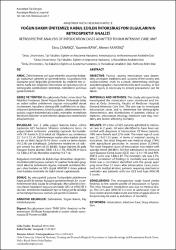Yoğun bakım ünitemize kabul edilen intoksikasyon olgularının retrospektif analizi
Abstract
AMAÇ: Zehirlenmeye yol açan etkenler yaşanılan bölgeye,
toplumun gelenek ve göreneklerine, sosyoekonomik
düzeyine göre değişiklik gösterebilir. Bu nedenle her ülkenin,
hatta her bölgenin zehirlenme ile ilgili etyolojik ve
demografik özelliklerinin belirlenip, önlemlerin alınması
gerekmektedir.
GEREÇ VE YÖNTEM: Bu çalışmada Ordu Üniversitesi Tıp
Fakültesi Hastanesi Genel Yoğun Bakım Ünitesinde takip
ve tedavi edilen zehirlenme olguları retrospektif olarak
incelenerek, hastaların demografik özelliklerinin ve dağı-
lımlarının belirlenmesi, klinik bulguları, zehirlenmenin etyolojisi,
yoğun bakımda kalış süresi, mortalite, mortaliteyi
etkileyen faktörler ve zehirlenme vakalarının incelenmesi
amaçlanmıştır.
BULGULAR: Son 2 yılda yoğun bakıma kabul edilen
toplamda 625 hastanın 54’ünün zehirlenme tanısı ile
yoğun bakım ünitemize yatırıldığı saptandı. Bu hastaların%
78’i kadın,% 22’si erkek idi. Olguların yaş ortalaması
22.13±11.33 idi. Zehirlenmeye neden olan madde olarak
ise en sık tıbbi ilaçlar (%74) ikinci sırada ise tarım ilaçları
(%12.96) yer almaktaydı. Zehirlenme nedeni en sık özkı-
yım amaçlı ilaç alımı idi (% 88.88). Yoğun bakıma ilk geliş
Glasgow koma skorları (GKS) 13,1±1.95, APACHE II skoru
ise 5.88±2.47 idi. Mortalite oranımız %3.7 idi.
Bulguların mortalite ile ilişkili olup olmadıkları değerlendirildiklerinde
başvuru zamanı 12 saatten fazla olan grup,
metil alkol ile zehirlenen olgular, mekanik ventilatör ihtiyacı
olan hastalar ve GKS düşük APACHE II skoru yüksek
olan hastalar mortalite ile ilişkili olarak saptanmıştır.
SONUÇ: Bu retrospektif çalışma Türkiye’deki zehirlenme
hasta profili ile benzer bulgular göstermektedir. En sık zehirlenmeler
tıbbi ilaçlar ile olmaktadır. Mortalite belirleyicisi
olarak hastaların başvuru anındaki GKS ve APACHE II
skorları, zehirlenen maddenin tipi ve hangi yol ile alındığı
ve hastaneye başvuru zamanı yol gösterici olabilir. OBJECTIVE: Factors causing intoxication vary depending
on region, traditions and customs of the society and
socioeconomic level. As a result, determining etiologic
and demographic characteristics for each country, in fact
each region, is necessary to ensure precautions can be
taken.
MATERIALS AND METHODS: This study retrospectively
investigated the intoxication cases monitored and treated
at Ordu University, Faculty of Medicine Hospital,
General Intensive Care Unit. The aim was to investigate
intoxication cases and to determine the demographic
characteristics and distributions of patients, clinical symptoms,
intoxication etiology, intensive care stay, mortality
and factors affecting mortality.
RESULTS: Of a total of 625 patients admitted to intensive
care in 2 years, 54 were identified to have been admitted
with diagnosis of intoxication. Of these patients,
78% were female and 22% male. The mean age of cases
was 22.13±11.33 years. In terms of material causing intoxication,
the most frequent was medical drugs (74%)
with agricultural pesticides in second place (12.96%).
The most frequent cause of intoxication was intake with
suicidal intent (88.88%). On first admittance to intensive
care Glasgow Coma Score (GCS) was 13.1±1.95 and APACHE
II score was 5.88±2.47. The mortality rate was 3.7%.
When correlation of findings to mortality was assessed,
there was a correlation identified with the group applying
more than 12 hours after intoxication, cases poisoned
with methyl alcohol, patients requiring mechanical
ventilator and patients with low GCS and high APACHE
II scores.
CONCLUSIONS: This retrospective study found similar
findings to the patient profile of intoxication in Turkey.
The most frequent intoxication was due to medical drugs.
The GCS and APACHE II scores at admission, type of
toxic material and intake route and time of application to
hospital may be used as indicators of mortality.
Source
Afyon Kocatepe Üniversitesi, Kocatepe Tıp DergisiVolume
17Issue
3URI
http://kocatepetipdergisi.aku.edu.tr/wp-content/uploads/2017/08/4.-42-16-A-Ebru-%C3%87ANAK%C3%87I.pdfhttp://hdl.handle.net/11630/4705
Collections
- Kocatepe Tıp Dergisi [154]



















